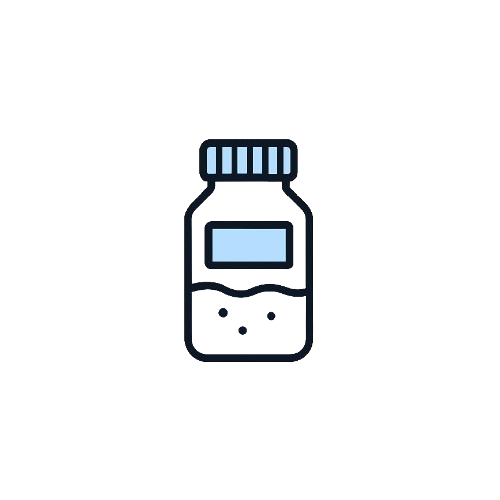Barium Sulfate
Allopathic
Medicines List
All MedicineIndications
- Radiographic contrast agent used for diagnostic imaging of the gastrointestinal (GI) tract.
- Visualization of the esophagus, stomach, small intestine, and colon in procedures such as barium swallow, barium meal, barium follow-through, and barium enema.
- Detection and evaluation of abnormalities including strictures, tumors, ulcers, fistulas, and motility disorders.
Dosage & Administration
- Route: Oral or rectal, depending on the imaging procedure.
- Oral administration: Typically 200–500 mL of barium sulfate suspension for upper GI tract studies. Pediatric doses are weight-based and adjusted accordingly.
- Rectal administration: For lower GI tract imaging (barium enema), volume ranges from 500–1500 mL depending on procedure protocol and patient size.
- Patients should fast prior to upper GI studies.
- Hydration after the procedure is important to aid elimination.
- No dose adjustments needed for renal or hepatic impairment as barium sulfate is not absorbed systemically.
Mechanism of Action (MOA)
Barium sulfate is an inert, insoluble compound that serves as a radiopaque contrast medium. When administered into the GI tract, it coats the mucosal lining and absorbs X-rays, producing a white silhouette on radiographs. This contrast enhancement allows detailed visualization of GI tract anatomy and abnormalities without systemic pharmacologic effects.
Pharmacokinetics
- Absorption: Negligible; barium sulfate is not absorbed from the GI tract.
- Distribution and Metabolism: Not applicable due to lack of absorption.
- Excretion: Eliminated unchanged via feces.
- Onset: Immediate contrast effect upon administration.
- Duration: Contrast persists until barium is fully expelled.
Pregnancy Category & Lactation
- Pregnancy: No known systemic absorption; use only if clinically necessary with appropriate precautions to minimize fetal radiation exposure.
- Lactation: Considered safe due to lack of systemic absorption.
Therapeutic Class
- Radiographic contrast agent
- Diagnostic agent for gastrointestinal imaging
Contraindications
- Hypersensitivity to barium sulfate or formulation excipients.
- Suspected or confirmed GI tract perforation.
- Obstruction or severe constipation.
- Acute abdomen of unknown cause unless benefits outweigh risks.
Warnings & Precautions
- Risk of aspiration during oral administration, especially in patients with swallowing difficulties.
- Avoid use if GI perforation or obstruction is suspected due to risk of barium leakage causing peritonitis.
- Adequate hydration post-procedure to prevent constipation or impaction.
- Monitor for allergic reactions, though rare.
Side Effects
- Common: Transient constipation, white or pale stools.
- Rare: Aspiration pneumonia, bowel impaction or obstruction, hypersensitivity reactions.
- Possible mild abdominal discomfort during procedure.
Drug Interactions
- No systemic drug interactions due to lack of absorption.
- May interfere with absorption of oral medications if administered concomitantly; separate timing advised.
- No known food or alcohol interactions.
Recent Updates or Guidelines
- Continued recommendation against use in suspected GI perforation, favoring water-soluble contrast agents in such cases.
- Reinforced procedural guidelines to minimize aspiration risk.
- No significant changes in dosage or indications.
Storage Conditions
- Store at 20°C to 25°C (68°F to 77°F).
- Protect from moisture and freezing.
- Keep container tightly closed and away from light.
- Keep out of reach of children.
